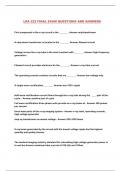Overig
Taak 5 Lose attention
- Instelling
- Maastricht University (UM)
Comprises all literature and pictures of relevant models etc. After each tutorial I added missing information and informatie from lectures. All tasks are therefore complete.
[Meer zien]






